虚拟语气的用法及经典练习题(附答案)
- 格式:docx
- 大小:25.19 KB
- 文档页数:12
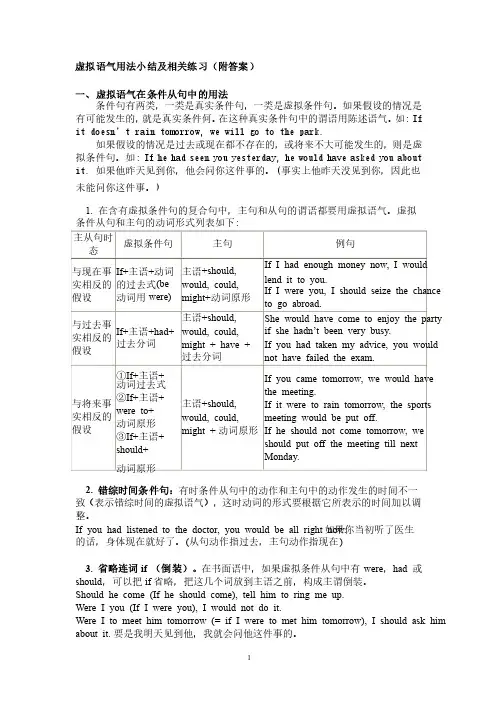
虚拟语气用法小结及相关练习(附答案)一、虚拟语气在条件从句中的用法 条件句有两类,条件句有两类,一类是真实条件句,一类是真实条件句,一类是真实条件句,一类是虚拟条件句。
一类是虚拟条件句。
一类是虚拟条件句。
如果假设的情况是如果假设的情况是有可能发生的,就是真实条件何。
在这种真实条件句中的谓语用陈述语气。
如: If it doesn’t rain tomorrow, we will go to the park.如果假设的情况是过去或现在都不存在的,如果假设的情况是过去或现在都不存在的,或将来不大可能发生的,或将来不大可能发生的,则是虚拟条件句。
如拟条件句。
如: : If he had seen you yesterday, yesterday, he he would have asked you about it. it. 如果他昨天见到你,他会问你这件事的。
如果他昨天见到你,他会问你这件事的。
(事实上他昨天没见到你,因此也未能问你这件事。
未能问你这件事。
) )1. 在含有虚拟条件句的复合句中,主句和从句的谓语都要用虚拟语气。
虚拟条件从句和主句的动词形式列表如下: 主从句时态虚拟条件句虚拟条件句 主句主句 例句例句 与现在事与现在事 实相反的实相反的 假设假设 If+主语+动词动词 的过去式(be 动词用were) 主语+should, would, could, might+动词原形动词原形 If I had enough money now, I would lend it to you. If I were you, I should seize the chance to go abroad. 与过去事与过去事 实相反的实相反的 假设假设 If+主语+had+ 过去分词过去分词 主语+should, would, could, might + have + 过去分词过去分词 She would have come to enjoy the party if she hadn’t been very busy. If you had taken my advice, you would not have failed the exam. 与将来事与将来事 实相反的实相反的 假设假设 ①If+主语+ 动词过去式动词过去式②If+主语+ were to+ 动词原形动词原形 ③If+主语+ should+ 动词原形动词原形 主语+should, would, could, might + 动词原形动词原形 If you came tomorrow, we would have the meeting. If it were to rain tomorrow, the sports meeting would be put off. If he should not come tomorrow, we should put off the meeting till next Monday. 2. 错综时间条件句:有时条件从句中的动作和主句中的动作发生的时间不一致(表示错综时间的虚拟语气)(表示错综时间的虚拟语气),,这时动词的形式要根据它所表示的时间加以调整。
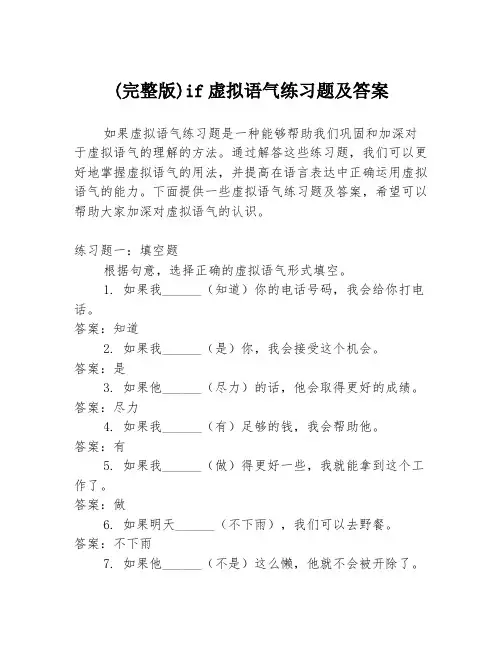
(完整版)if虚拟语气练习题及答案如果虚拟语气练习题是一种能够帮助我们巩固和加深对于虚拟语气的理解的方法。
通过解答这些练习题,我们可以更好地掌握虚拟语气的用法,并提高在语言表达中正确运用虚拟语气的能力。
下面提供一些虚拟语气练习题及答案,希望可以帮助大家加深对虚拟语气的认识。
练习题一:填空题根据句意,选择正确的虚拟语气形式填空。
1. 如果我______(知道)你的电话号码,我会给你打电话。
答案:知道2. 如果我______(是)你,我会接受这个机会。
答案:是3. 如果他______(尽力)的话,他会取得更好的成绩。
答案:尽力4. 如果我______(有)足够的钱,我会帮助他。
答案:有5. 如果我______(做)得更好一些,我就能拿到这个工作了。
答案:做6. 如果明天______(不下雨),我们可以去野餐。
答案:不下雨7. 如果他______(不是)这么懒,他就不会被开除了。
答案:不是8. 如果你______(去)采取行动,你将失去这个机会。
答案:去9. 如果他______(读)更多的书,他的知识会更丰富。
答案:读10. 如果我______(拥有)魔法,我将会改变世界。
答案:拥有练习题二:选择题选择最佳答案填空。
1. 如果我______(会)弹钢琴,我会给你弹一首歌。
a. 会b. 能c. 可以d. 有答案:a. 会2. 如果你______(是)我,你会怎么做?a. 是b. 是的c. 如果d. 可以答案:a. 是3. 如果明天______(没有)下雨,我们可以去郊游。
a. 没有b. 不下c. 不下雨d. 不来答案:c. 不下雨4. 如果他______(学习)更努力,他会取得更好的成绩。
a. 学习b. 学习了c. 学习过d. 学习到答案:a. 学习5. 如果我______(有)足够的钱,我会买一辆新车。
a. 有b. 拥有c. 会有d. 有着答案:a. 有练习题三:改错题找出下列句子中的错误,并进行改正。
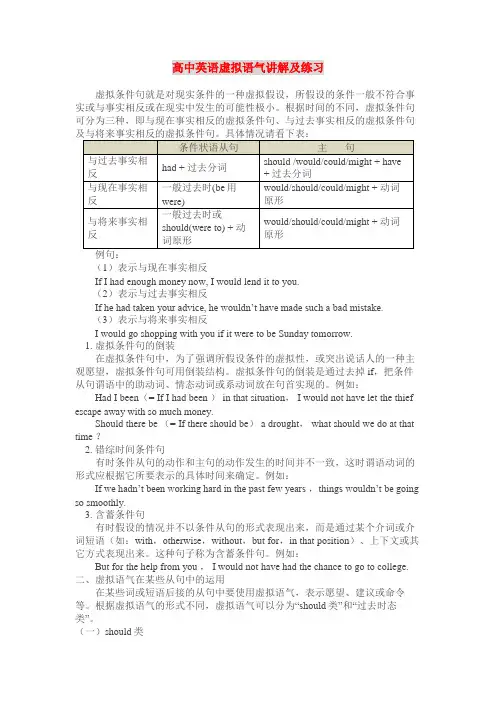
高中英语虚拟语气讲解及练习虚拟条件句就是对现实条件的一种虚拟假设,所假设的条件一般不符合事实或与事实相反或在现实中发生的可能性极小。
根据时间的不同,虚拟条件句可分为三种,即与现在事实相反的虚拟条件句、与过去事实相反的虚拟条件句(1)表示与现在事实相反If I had enough money now, I would lend it to you.(2)表示与过去事实相反If he had taken your advice, he wouldn’t have made such a bad mistake.(3)表示与将来事实相反I would go shopping with you if it were to be Sunday tomorrow.1. 虚拟条件句的倒装在虚拟条件句中,为了强调所假设条件的虚拟性,或突出说话人的一种主观愿望,虚拟条件句可用倒装结构。
虚拟条件句的倒装是通过去掉if,把条件从句谓语中的助动词、情态动词或系动词放在句首实现的。
例如:Had I been(= If I had been ) in that situation, I would not have let the thief escape away with so much money.Should there be (= If there should be) a drought, what should we do at that time ?2. 错综时间条件句有时条件从句的动作和主句的动作发生的时间并不一致,这时谓语动词的形式应根据它所要表示的具体时间来确定。
例如:If we hadn’t been working hard in the past few years ,thing s wouldn’t be going so smoothly.3. 含蓄条件句有时假设的情况并不以条件从句的形式表现出来,而是通过某个介词或介词短语(如:with,otherwise,without,but for,in that position)、上下文或其它方式表现出来。
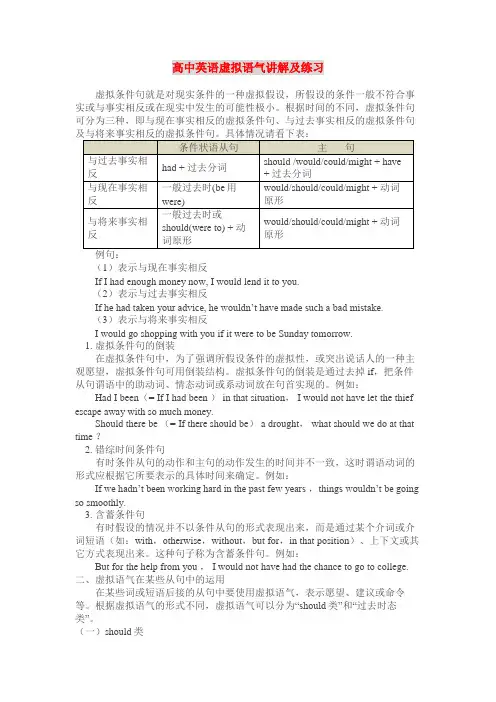
高中英语虚拟语气讲解及练习虚拟条件句就是对现实条件的一种虚拟假设,所假设的条件一般不符合事实或与事实相反或在现实中发生的可能性极小。
根据时间的不同,虚拟条件句可分为三种,即与现在事实相反的虚拟条件句、与过去事实相反的虚拟条件句(1)表示与现在事实相反If I had enough money now, I would lend it to you.(2)表示与过去事实相反If he had taken your advice, he wouldn’t have made such a bad mistake.(3)表示与将来事实相反I would go shopping with you if it were to be Sunday tomorrow.1. 虚拟条件句的倒装在虚拟条件句中,为了强调所假设条件的虚拟性,或突出说话人的一种主观愿望,虚拟条件句可用倒装结构。
虚拟条件句的倒装是通过去掉if,把条件从句谓语中的助动词、情态动词或系动词放在句首实现的。
例如:Had I been(= If I had been ) in that situation, I would not have let the thief escape away with so much money.Should there be (= If there should be) a drought, what should we do at that time ?2. 错综时间条件句有时条件从句的动作和主句的动作发生的时间并不一致,这时谓语动词的形式应根据它所要表示的具体时间来确定。
例如:If we hadn’t been working hard in the past few years ,thing s wouldn’t be going so smoothly.3. 含蓄条件句有时假设的情况并不以条件从句的形式表现出来,而是通过某个介词或介词短语(如:with,otherwise,without,but for,in that position)、上下文或其它方式表现出来。
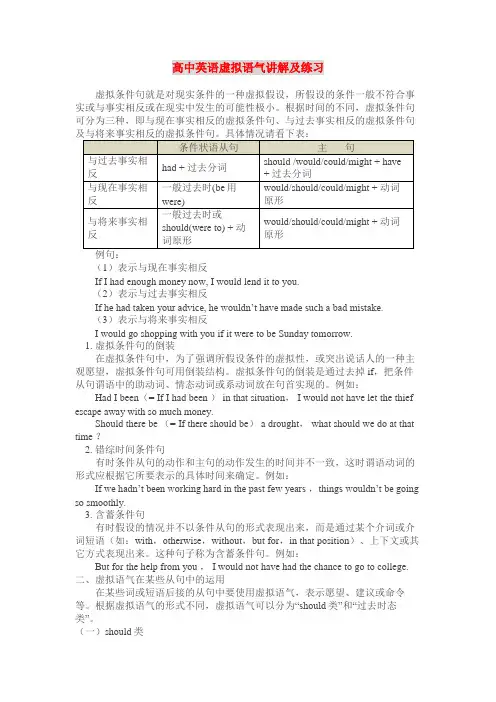
高中英语虚拟语气讲解及练习虚拟条件句就是对现实条件的一种虚拟假设,所假设的条件一般不符合事实或与事实相反或在现实中发生的可能性极小。
根据时间的不同,虚拟条件句可分为三种,即与现在事实相反的虚拟条件句、与过去事实相反的虚拟条件句(1)表示与现在事实相反If I had enough money now, I would lend it to you.(2)表示与过去事实相反If he had taken your advice, he wouldn’t have made such a bad mistake.(3)表示与将来事实相反I would go shopping with you if it were to be Sunday tomorrow.1. 虚拟条件句的倒装在虚拟条件句中,为了强调所假设条件的虚拟性,或突出说话人的一种主观愿望,虚拟条件句可用倒装结构。
虚拟条件句的倒装是通过去掉if,把条件从句谓语中的助动词、情态动词或系动词放在句首实现的。
例如:Had I been(= If I had been ) in that situation, I would not have let the thief escape away with so much money.Should there be (= If there should be) a drought, what should we do at that time ?2. 错综时间条件句有时条件从句的动作和主句的动作发生的时间并不一致,这时谓语动词的形式应根据它所要表示的具体时间来确定。
例如:If we hadn’t been working hard in the past few years ,thing s wouldn’t be going so smoothly.3. 含蓄条件句有时假设的情况并不以条件从句的形式表现出来,而是通过某个介词或介词短语(如:with,otherwise,without,but for,in that position)、上下文或其它方式表现出来。
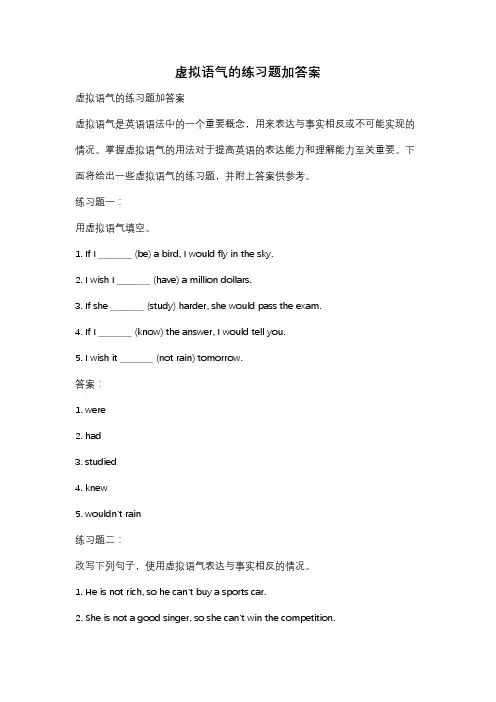
虚拟语气的练习题加答案虚拟语气的练习题加答案虚拟语气是英语语法中的一个重要概念,用来表达与事实相反或不可能实现的情况。
掌握虚拟语气的用法对于提高英语的表达能力和理解能力至关重要。
下面将给出一些虚拟语气的练习题,并附上答案供参考。
练习题一:用虚拟语气填空。
1. If I ________ (be) a bird, I would fly in the sky.2. I wish I ________ (have) a million dollars.3. If she ________ (study) harder, she would pass the exam.4. If I ________ (know) the answer, I would tell you.5. I wish it ________ (not rain) tomorrow.答案:1. were2. had3. studied4. knew5. wouldn't rain练习题二:改写下列句子,使用虚拟语气表达与事实相反的情况。
1. He is not rich, so he can't buy a sports car.2. She is not a good singer, so she can't win the competition.3. They didn't study hard, so they failed the test.4. I don't have a passport, so I can't travel abroad.5. It's not warm, so we can't go swimming.答案:1. If he were rich, he could buy a sports car.2. If she were a good singer, she could win the competition.3. If they had studied hard, they wouldn't have failed the test.4. If I had a passport, I could travel abroad.5. If it were warm, we could go swimming.练习题三:选择正确的虚拟语气形式填空。
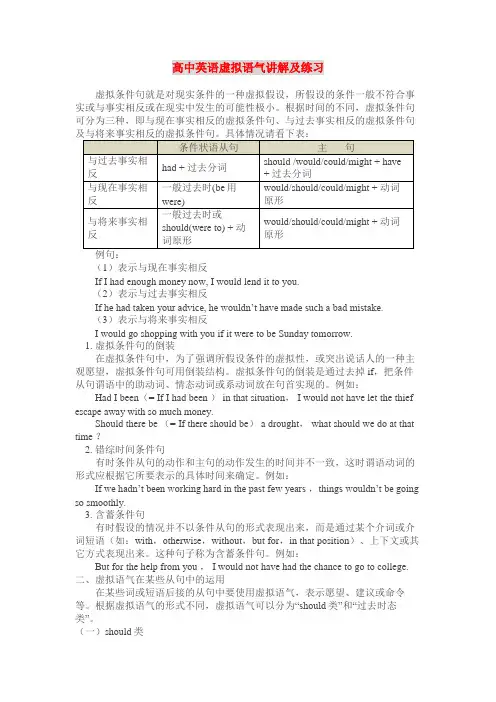
高中英语虚拟语气讲解及练习虚拟条件句就是对现实条件的一种虚拟假设,所假设的条件一般不符合事实或与事实相反或在现实中发生的可能性极小。
根据时间的不同,虚拟条件句可分为三种,即与现在事实相反的虚拟条件句、与过去事实相反的虚拟条件句(1)表示与现在事实相反If I had enough money now, I would lend it to you.(2)表示与过去事实相反If he had taken your advice, he wouldn’t have made such a bad mistake.(3)表示与将来事实相反I would go shopping with you if it were to be Sunday tomorrow.1. 虚拟条件句的倒装在虚拟条件句中,为了强调所假设条件的虚拟性,或突出说话人的一种主观愿望,虚拟条件句可用倒装结构。
虚拟条件句的倒装是通过去掉if,把条件从句谓语中的助动词、情态动词或系动词放在句首实现的。
例如:Had I been(= If I had been ) in that situation, I would not have let the thief escape away with so much money.Should there be (= If there should be) a drought, what should we do at that time ?2. 错综时间条件句有时条件从句的动作和主句的动作发生的时间并不一致,这时谓语动词的形式应根据它所要表示的具体时间来确定。
例如:If we hadn’t been working hard in the past few years ,thing s wouldn’t be going so smoothly.3. 含蓄条件句有时假设的情况并不以条件从句的形式表现出来,而是通过某个介词或介词短语(如:with,otherwise,without,but for,in that position)、上下文或其它方式表现出来。
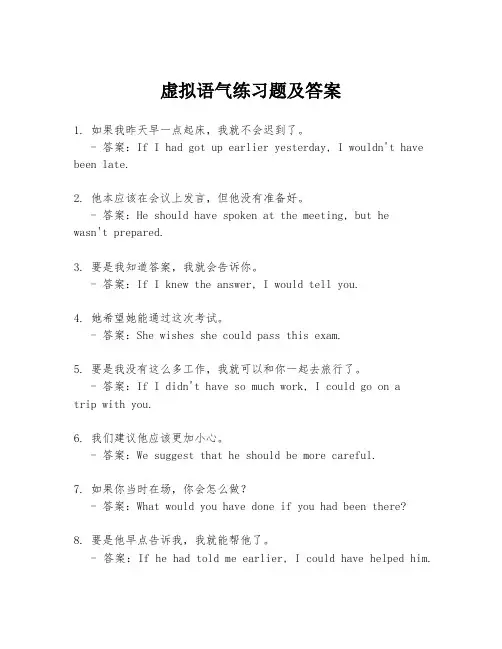
虚拟语气练习题及答案1. 如果我昨天早一点起床,我就不会迟到了。
- 答案:If I had got up earlier yesterday, I wouldn't have been late.2. 他本应该在会议上发言,但他没有准备好。
- 答案:He should have spoken at the meeting, but hewasn't prepared.3. 要是我知道答案,我就会告诉你。
- 答案:If I knew the answer, I would tell you.4. 她希望她能通过这次考试。
- 答案:She wishes she could pass this exam.5. 要是我没有这么多工作,我就可以和你一起去旅行了。
- 答案:If I didn't have so much work, I could go on atrip with you.6. 我们建议他应该更加小心。
- 答案:We suggest that he should be more careful.7. 如果你当时在场,你会怎么做?- 答案:What would you have done if you had been there?8. 要是他早点告诉我,我就能帮他了。
- 答案:If he had told me earlier, I could have helped him.9. 我本应该更加努力地学习。
- 答案:I should have studied harder.10. 要是他没有生病,他就能参加比赛了。
- 答案:If he hadn't been sick, he could haveparticipated in the competition.答案解析- 虚拟语气通常用于表示与现实相反的情况,或者表达愿望、建议等。
- 虚拟语气的构成通常包括“if”引导的条件句和主句中的“would/should/could/might + 动词原形”。
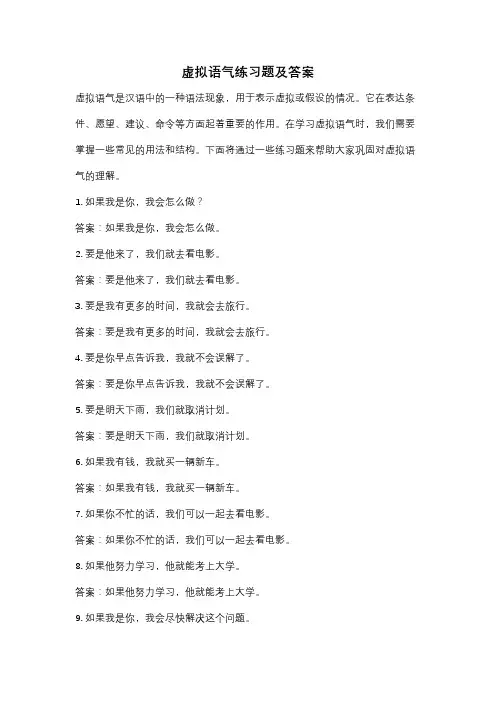
虚拟语气练习题及答案虚拟语气是汉语中的一种语法现象,用于表示虚拟或假设的情况。
它在表达条件、愿望、建议、命令等方面起着重要的作用。
在学习虚拟语气时,我们需要掌握一些常见的用法和结构。
下面将通过一些练习题来帮助大家巩固对虚拟语气的理解。
1. 如果我是你,我会怎么做?答案:如果我是你,我会怎么做。
2. 要是他来了,我们就去看电影。
答案:要是他来了,我们就去看电影。
3. 要是我有更多的时间,我就会去旅行。
答案:要是我有更多的时间,我就会去旅行。
4. 要是你早点告诉我,我就不会误解了。
答案:要是你早点告诉我,我就不会误解了。
5. 要是明天下雨,我们就取消计划。
答案:要是明天下雨,我们就取消计划。
6. 如果我有钱,我就买一辆新车。
答案:如果我有钱,我就买一辆新车。
7. 如果你不忙的话,我们可以一起去看电影。
答案:如果你不忙的话,我们可以一起去看电影。
8. 如果他努力学习,他就能考上大学。
答案:如果他努力学习,他就能考上大学。
9. 如果我是你,我会尽快解决这个问题。
答案:如果我是你,我会尽快解决这个问题。
10. 如果我有机会,我会去世界各地旅行。
答案:如果我有机会,我会去世界各地旅行。
通过以上练习题,我们可以看出虚拟语气在表示假设、条件和愿望等方面的灵活运用。
在实际应用中,我们可以根据具体的语境来选择使用虚拟语气,以达到更准确地表达自己的意思。
虚拟语气的学习需要不断的练习和积累,通过大量的阅读和写作,我们可以逐渐熟悉并掌握虚拟语气的用法。
同时,我们还可以结合语法书籍和教材进行系统学习,加深对虚拟语气的理解和运用。
总之,虚拟语气是汉语中一种重要的语法现象,掌握好虚拟语气的用法对于提高语言表达能力非常有帮助。
希望通过以上的练习题和答案,大家能够更好地理解和应用虚拟语气,提升自己的语言水平。
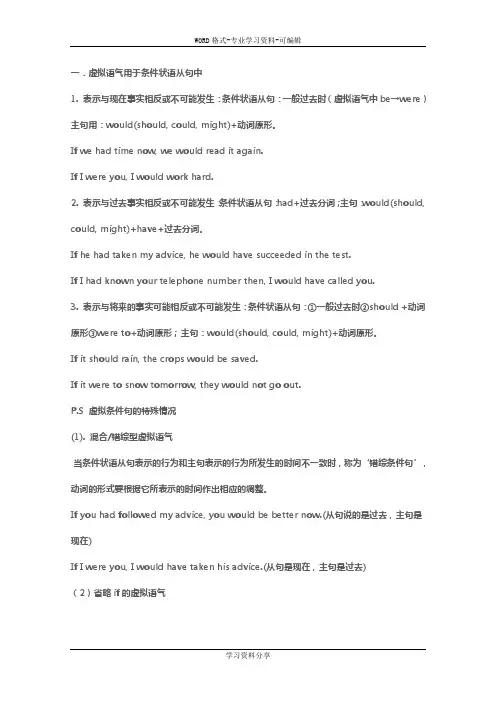
一.虚拟语气用于条件状语从句中1. 表示与现在事实相反或不可能发生:条件状语从句:一般过去时(虚拟语气中be→were)主句用:would(should, could, might)+动词原形。
If we had time now, we would read it again.If I were you, I would work hard.2. 表示与过去事实相反或不可能发生:条件状语从句:had+过去分词;主句:would(should, could, might)+have+过去分词。
If he had taken my advice, he would have succeeded in the test.If I had known your telephone number then, I would have called you.3. 表示与将来的事实可能相反或不可能发生:条件状语从句:①一般过去时②should +动词原形③were to+动词原形;主句:would(should, could, might)+动词原形。
If it should rain, the crops would be saved.If it were to snow tomorrow, they would not go out.P.S 虚拟条件句的特殊情况(1). 混合/错综型虚拟语气当条件状语从句表示的行为和主句表示的行为所发生的时间不一致时,称为‘错综条件句’,动词的形式要根据它所表示的时间作出相应的调整。
If you had followed my advice, you would be better now.(从句说的是过去,主句是现在)If I were you, I would have taken his advice.(从句是现在,主句是过去)(2)省略if的虚拟语气如果从句中含有were/ should/ had时,则可以把这三个词置于句首,省略if.采用倒装语序。
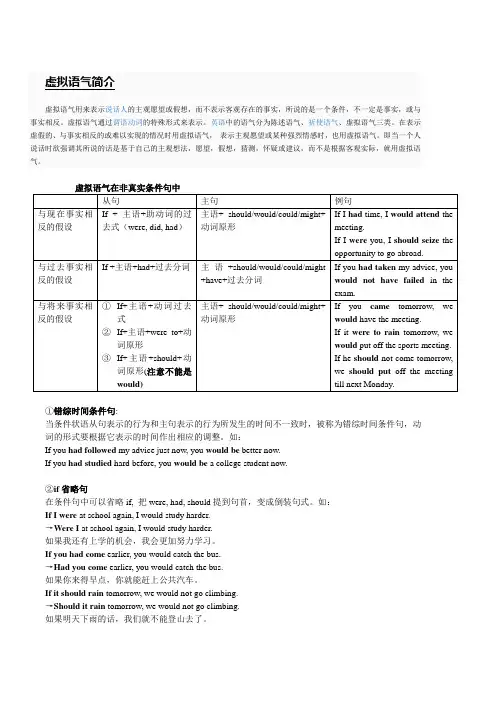
虚拟语气简介虚拟语气用来表示说话人的主观愿望或假想,而不表示客观存在的事实,所说的是一个条件,不一定是事实,或与事实相反。
虚拟语气通过谓语动词的特殊形式来表示。
英语中的语气分为陈述语气、祈使语气、虚拟语气三类。
在表示虚假的、与事实相反的或难以实现的情况时用虚拟语气,表示主观愿望或某种强烈情感时,也用虚拟语气。
即当一个人说话时欲强调其所说的话是基于自己的主观想法,愿望,假想,猜测,怀疑或建议,而不是根据客观实际,就用虚拟语气。
①错综时间条件句:当条件状语从句表示的行为和主句表示的行为所发生的时间不一致时,被称为错综时间条件句,动词的形式要根据它表示的时间作出相应的调整。
如:If you had followed my advice just now, you would be better now.If you had studied hard before, you would be a college student now.②if省略句在条件句中可以省略if, 把were, had, should提到句首,变成倒装句式。
如:If I were at school again, I would study harder.→Were I at school again, I would study harder.如果我还有上学的机会,我会更加努力学习。
If you had come earlier, you would catch the bus.→Had you come earlier, you would catch the bus.如果你来得早点,你就能赶上公共汽车。
If it should rain tomorrow, we would not go climbing.→Should it rain tomorrow, we would not go climbing.如果明天下雨的话,我们就不能登山去了。
虚拟语气的用法及练习题什么是虚拟语气?虚拟语气是一种用于表示假设、愿望、建议、命令等非真实情况的语气。
在汉语中,常用的虚拟语气包括:“要是”、“如果”、“希望”、“愿意”等词语。
在英语中,出现虚拟语气的情况更加复杂,涉及动词的形态变化、从句的结构等。
虚拟语气的用法以下是一些常见的虚拟语气用法:1. 表示假设:* If I were you, I would go to the party.(如果我是你,我会去参加聚会。
)* I wish I could speak fluent French.(我希望我能说一口流利的法语。
)2. 表示建议:* I suggest that you take a break.(我建议你休息一下。
)* It's important that he arrive on time.(他准时到达很重要。
)3. 表示命令:* The teacher insisted that the assignment be submitted by Friday.(老师坚持要求作业周五之前提交。
)* It is required that all employees wear safety helmets.(要求所有员工佩戴安全头盔。
)4. 表示愿望:* I hope you have a great trip.(祝你旅途愉快。
)* If only I could win the lottery!(要是我能中彩票就好了!)虚拟语气练题下面是一些虚拟语气的练题,请选择正确的答案:1. If I _______ a superhero, I would fly around the world.A. amB. wereC. will beD. would be2. It is important that every student _______ their homework on time.A. finishesB. finishedC. finishD. will finish3. I suggest that we _______ a meeting to discuss the issue.A. will haveB. haveC. hadD. having4. I wish I _______ more time to study for the exam.A. haveB. hadC. will haveD. would have答案:1. B;2. C;3. B;4. B以上是关于虚拟语气的用法及练习题的内容。
(完整版)虚拟语⽓的⽤法及经典练习题(附答案)虚拟语⽓概念虚拟语⽓⽤来表⽰说话⼈的主观愿望或假想,⽽不表⽰客观存在的事实,所说的是⼀个条件,不⼀定是事实,或与事实相反。
虚拟语⽓通过谓语动词的特殊形式来表⽰。
英语中的语⽓分为陈述语⽓、祈使语⽓、虚拟语⽓三类。
应⽤条件在表⽰虚假的、与事实相反的或难以实现的情况时⽤虚拟语⽓,表⽰主观愿望或某种强烈情感时,也⽤虚拟语⽓。
即当⼀个⼈说话时欲强调其所说的话是基于⾃⼰的主观想法,⽽不是根据客观实际,就⽤虚拟语⽓。
在⾮真实条件状语从句中的⽤法真实条件状语从句与⾮真实条件状语从句条件句可分为两类,⼀类为真实条件句,⼀类为⾮真实条件句。
⾮真实条件句表⽰的是假设或实际可能性不⼤的情况,故采⽤虚拟语⽓。
例: If he doesn’t hurry up, he will miss the bus. 如果他不快点,他将错过巴⼠。
( 真实) If he is free, he will ask me to tell stories. 如果他是空闲的,他会要求我讲故事。
(真实)If I were you, I would go at once.如果我是你,我马上就会去。
(⾮真实,虚拟语⽓)If there were no air, people would die. 如果没有空⽓,⼈就会死亡。
(⾮真实,虚拟语⽓)⽤法及动词形式例句:1、表⽰与现在事实相反的情况:例: 1. If I were you, I would take an umbrella. 如果我是你,我会带把伞。
(事实:我不可能是你) 2.If I knew his telephone number, I would tell you. 如果我知道他的电话号码,我就会告诉你。
(事实:不知道) 3.If there were no air or water, there would be no living things on the earth. 如果没有⽔和空⽓,地球上就不会有⽣物。
高中英语虚拟语气讲解及练习虚拟条件句就是对现实条件的一种虚拟假设,所假设的条件一般不符合事实或与事实相反或在现实中发生的可能性极小。
根据时间的不同,虚拟条件句可分为三种,即与现在事实相反的虚拟条件句、与过去事实相反的虚拟条件句(1)表示与现在事实相反If I had enough money now, I would lend it to you.(2)表示与过去事实相反If he had taken your advice, he wouldn’t have made such a bad mistake.(3)表示与将来事实相反I would go shopping with you if it were to be Sunday tomorrow.1. 虚拟条件句的倒装在虚拟条件句中,为了强调所假设条件的虚拟性,或突出说话人的一种主观愿望,虚拟条件句可用倒装结构。
虚拟条件句的倒装是通过去掉if,把条件从句谓语中的助动词、情态动词或系动词放在句首实现的。
例如:Had I been(= If I had been ) in that situation, I would not have let the thief escape away with so much money.Should there be (= If there should be) a drought, what should we do at that time ?2. 错综时间条件句有时条件从句的动作和主句的动作发生的时间并不一致,这时谓语动词的形式应根据它所要表示的具体时间来确定。
例如:If we hadn’t been working hard in the past few years ,thing s wouldn’t be going so smoothly.3. 含蓄条件句有时假设的情况并不以条件从句的形式表现出来,而是通过某个介词或介词短语(如:with,otherwise,without,but for,in that position)、上下文或其它方式表现出来。
高中英语虚拟语气讲解及练习虚拟条件句就是对现实条件的一种虚拟假设,所假设的条件一般不符合事实或与事实相反或在现实中发生的可能性极小。
根据时间的不同,虚拟条件句可分为三种,即与现在事实相反的虚拟条件句、与过去事实相反的虚拟条件句(1)表示与现在事实相反If I had enough money now, I would lend it to you.(2)表示与过去事实相反If he had taken your advice, he wouldn’t have made such a bad mistake.(3)表示与将来事实相反I would go shopping with you if it were to be Sunday tomorrow.1. 虚拟条件句的倒装在虚拟条件句中,为了强调所假设条件的虚拟性,或突出说话人的一种主观愿望,虚拟条件句可用倒装结构。
虚拟条件句的倒装是通过去掉if,把条件从句谓语中的助动词、情态动词或系动词放在句首实现的。
例如:Had I been(= If I had been ) in that situation, I would not have let the thief escape away with so much money.Should there be (= If there should be) a drought, what should we do at that time ?2. 错综时间条件句有时条件从句的动作和主句的动作发生的时间并不一致,这时谓语动词的形式应根据它所要表示的具体时间来确定。
例如:If we hadn’t been working hard in the past few years ,thing s wouldn’t be going so smoothly.3. 含蓄条件句有时假设的情况并不以条件从句的形式表现出来,而是通过某个介词或介词短语(如:with,otherwise,without,but for,in that position)、上下文或其它方式表现出来。
虚拟语气的用法及练习(附答案)虚拟语气练习题一1.I enjoyed the movie very much. I wish I _____ the book from which it was made.A. have readB. had readC. should have readD. are reading2.You are late. If you _____ a few minutes earlier, you _____ him.A. come; would meetB. had come; would have metC. come; will meetD. had come; would meet3.The two students talked as if they _____ friends for years.A. should beB. would beC. have beenD. had been4.It is important that I _____ with Mr. Williams immediately.A. speakB. SpokeC. will speakD. to speak5.He looked as if he _____ ill for a long time.A. wasB. WereC. has beenD. had been6.If the doctor had come earlier, the poor child would not_____.A. have laid there for two hoursB. have been lied there for two hoursC. have lied there for two hoursD. have lain there for two hours7.I wish that I _____ with you last night.A. wentB. could goC. have goneD. could have gone8.Let’s say you could go t here again, how _____ feel?A. will youB. should youC. would youD. do you9.I can’t stand him. He always talks as though he _____ everything.A. knewB. KnowsC. has knownD. had known10._____ the fog, we should have reached our school.A. Because ofB. In spite ofC. In case ofD. But for11.If you had told me in advance, I _____ him at the airport.A. would meetB. would had metC. would have metD. would have meet12.Mike can take his car apart and put it back together again.I certainly wish he_____ me how.A. teachesB. will teachC. has taughtD. would teach13.I would have told him the answer had it been possible, but I _____ so busy then.A. had beenB. WereC. wasD. would be14.He’s working hard for fear that he _____.A. should fall behindB. fell behindC. may fall behindD. would fallen behind15.If it _____ another ten minutes, the game would have been called off.A. had rainedB. would have rainedC. have seenD. rained16.He suggested that they _____ use a trick instead of fighting.A. shouldB. WouldC. doD. had17.My father did not go to New York; the doctor suggestedthat he _____ there.A. not wentB. won’t goC. not goD. not to go18.I would have gone to the meeting if I _____ time.A. had hadB. have hadC. hadD. would have had19.Would you rather I _____ buying a new bike?A. decided againstB. will decide againstC. have decidedD. shall decide against20.You look so tired tonight. It is time you _____.A. go to sleepB. went to sleepC. go to bedD. went to bed21.—Why didn’t you buy a new car?—I would have bought one if I _____ enough money.A. hadB. have hadC. would haveD. had had22.If she could sew, _____.A. she make a dressB. she would have made a shirtC. she will make a shirtD. she would had made a coat23._____ today, he would get there by Friday.A. Would he leaveB. Was he leavingC. Were he to leaveD. If he leaves24.His doctor suggested that he _____ a short trip abroad.A. will takeB. would takeC. takeD. took25.The Bakers arrived last night. If they’d on ly let us know earlier,_____ at the station.A. we’d meet themB. we’ll meet themC. we’d have met themD. we’ve met them26.If I _____ you, I _____ more attention to English idioms and phrases.A. was; shall payB. am; will payC. would be; would payD. were; would pay27.We might have failed if you _____ us a helping hand.A. have not givenB. would not giveC. had not givenD. did not give28.The law requires that everyone _____ his car checked at least once a year.A. hasB. HadC. haveD. will have29.It is strange that he _____ so.A. would sayB. would speakC. should sayD. will speak30.Had I known her name, _____A. or does she know mine?B. and where does she live?C. she would be beautiful.D. I would have invited her to lunch.31.He has just arrived, but he talks as if he _____ all about that.A. knowB. KnowsC. knownD. knew32.If I _____ the money, I would have bought a much bigger car.A. possessedB. OwnedC. hadD. had had33.He was very busy yesterday; otherwise, he _____ to the meeting.A. would comeB. CameC. would have comeD. will come34.The librarian insists that John _____ no more books from the library before he returns all the books he has borrowed.A. will takeB. TookC. takeD. takes35.I left very early last night, but I wish I _____ so early.A. didn’t leaveB. ha dn’t leftC. haven’t leftD. couldn’t leave36.I do not have a job. I would find one but I _____ no time.A. hadB. didn’t haveC. had hadD. have37.I wish that you _____ such a bad headache because I’m sure that you woul d have enjoyed the concert.A. hadn’tB. didn’t have hadC. hadn’t hadD. hadn’t have38.He insisted that we all _____ in his office at one o’clock.A. beB. to beC. would beD. shall be39.Helen couldn’t go to France after all. That’s too bad. I’m sure she would have enjoyed it if _____.A. she’s goneB. she’ll goC. she’d goneD. she’d go40.I must go there earlier. John has suggested that I _____ an hour before the discussion begins.A. goB. shall goC. will goD. would虚拟语气练习题二1. If I ____ where he lived,I ____ a note to him.A. knew,wouldB. had known,would have sentC. know,would sendD. knew,would have sent2. If they ____ earlier than expected,they ____ here now.A. had started,would beB. started,might beC. had started,would have beenD. will start,might have been3. I didn't know his telephone number. ____ it,I ____ then.A. Had I known,would ring him upB. Should I know,would have rung him upC. If I knew;would ring him upD. Had I known;would have rung him up4. Mary is ill today. If she _____,she ____ absent from school.A. were not ill,wouldn't beB. had been ill,wouldn't have beenC. had been ill,should have beenD. hadn't been ill,could be5. Were I to do it,I ________ it some other way.A. will doB. would doC. would have doneD. were to do6. I ________ him the answer ________ possible,but I was so busy then.A. could tell,if it had beenB. must have told,were itC. should have told,had it beenD. should have told,should it be7. Without your help,we________ so much.A. won't achieveB. didn't achieveC. don't achieveD. wouldn't have achieved8. You didn't take his advice. ________ his advice,you ________ such a mistake.A. Had you taken,wouldn't have madeB. If you had taken,would makeC. Were you lo take,shouldn't have madeD. Have you taken,won't have made9. We wish we ____ what you did when we were at high school.A. didB. could have doneC. have doneD. should do10. She wishes she ____ to the theatre last night.A. wentB. would goC. had goneD. were going11. Tom is very short now. His mother wishes that he ________ be tall when he grows up.A. couldB. shouldC. wouldD. were able to12. My sister advised me that I ________ accept the invitation.A. couldB. mustC. shouldD. might13. He asks that he ________ an opportunity to explain why he's refused to go there.A. is givenB. must giveC. should giveD. be given14. Do you think of Wang Fang's suggestion that he ________ Mr. Li to the party?A. will inviteB. have invitedC. is invitedD. invite15. I insisted that he ________ at once.A. be goneB. goC. would goD. might go16. Li Ming insisted that he ________ anything at all.A. hadn't stolenB. shouldn't stealC. doesn't stealD. steal17. It is quite natural that my coming late again ________ them very angry.A. had madeB. would makeC. makesD. make18. He acted as if he ________ everything in the world.A. knewB. knowsC. has knownD. won't know19. Read it aloud so that I ________ you clearly.A. may hearB. will hearC. hearD. have heard20. They got up early in order that they ________ they first train.A. caughtB. will catchC. might catchD. shall catch21. I am sorry that he ________ in such poor health.A. areB. shall beC. wereD. should be22. That is a good book. You ________ it yesterday.A. could buyB. should buyC. should have boughtD. bought23. It is high time we ________ home.A. will goB. would goC. have goneD. went24. I'd rather that you ________ home.A. wentB. have goneC. will goD. had gone25. If only I _________ to the lecture!A. listenB. will listenC. am listeningD. had listened26. —— If he_____,he ______ that food.---- Luckily he was sent to the hospital immediately.A. was warned,would not takeB. had been warned,would not have takenC. would be warned,had not takenD. would have been warned,had not taken27. I didn't see your sister at the meeting. If she _________,she would have met my brother.A. has comeB. did comeC. cameD. had come28. Without electricity,human life ________ quite different today.A. isB. will beC. would have beenD. would be29. He ________ you more help,even though he was very busy.A. might have givenB. might giveC. may have givenD. may give30. If city noises _______ from increasing,people _______ shout to be heard even at the dinner table 20 years from now.A. are not kept,will have toB. are not kept,have toC. do not keep,will have toD. do not keep,have to31. Mike's father,as well as his mother,insisted that he ________ home.A. stayedB. could stayC. has stayedD. stay32. Mr. Smith insisted that he ________ the work all.A. had doneB. have doneC. didD. so33. Jane would never have gone to the party ________ that Mary would come to see her.A. has she knownB. had she knownC. if she knowD. if she has known34. If you had enough money,what ________?A. will you buyB. would you buyC. would you have boughtD. will you have bought35. If you ________ that film late last night,you wouldn't be so sleepy.A. didn't seeB. haven't seenC. wouldn't have seenD. hadn't seen36. Our monitor requested that ________.A. all the class studied more carefully the problemB. the problem was more carefully studiedC. with great care the problem could be studiedD. all the class study the problem more carefully37. —— Would you have called her up had it been possible?Yes, but I ________ busy doing my homework.A. wasB. wereC. had beenD. would be38. His tired face suggested that he ________ really tired after the long walk.A. had beenB. wasC. beD. should be39. It is important that we ________.A. shall close the window before we leaveB. will close the window before we leaveC. must close the window before we leaveD. close the window before we leave40. I didn't know his telephone number,otherwise I ______ him.A. had telephonedB. would telephoneC. would have telephonedD. telephone1—5 BBDAD 6—10 DDCAD11—15 CDCAA16—20 ACAAD 21—25 DBCCC 26—30 DCCCD31—35 DDCCB 36—40 DCACD 解析:1.wish后面用虚拟语气,表示与过去事实相反用过去完成时。
高中虚拟语气练习题及讲解1. 题目:假如你昨天没有忘记带手机,你就不会错过那个重要的电话。
答案:If you hadn't forgotten to bring your phone yesterday, you wouldn't have missed that important call.2. 题目:如果他没有生病,他就会参加我们的聚会。
答案:If he hadn't fallen ill, he would have joined our party.3. 题目:如果我有足够的钱,我就会买下那栋房子。
答案:If I had enough money, I would buy that house.4. 题目:如果她没有迟到,她就不会错过那趟火车。
答案:If she hadn't been late, she wouldn't have missedthe train.5. 题目:如果他们没有取消会议,我们就会讨论这个问题。
答案:If they hadn't canceled the meeting, we would have discussed this issue.6. 题目:假如我们昨天没有下雨,我们就去野餐了。
答案:If it hadn't rained yesterday, we would have gonefor a picnic.7. 题目:如果他没有努力学习,他就不会通过考试。
答案:If he hadn't studied hard, he wouldn't have passedthe exam.8. 题目:如果我没有收到你的邮件,我就不会知道这个消息。
答案:If I hadn't received your email, I wouldn't have known the news.9. 题目:假如我们提前出发,我们就不会迟到。
虚拟语气概念虚拟语气用来表示说话人的主观愿望或假想,而不表示客观存在的事实,所说的是一个条件, 不一定是事实,或与事实相反。
虚拟i吾气通过谓语动词的特殊形式来表示。
英语中的语气分为陈述语气、祈使语气、虚拟语气三类。
应用条件在表示虚假的、与事实相反的或难以实现的情况时用虚拟语气,表示主观愿望或某种强烈情感时,也用虚拟语气。
即当一个人说话时欲强调其所说的话是基于自己的主观想法,而不是根据客观实际,就用虚拟语气。
在非真实条件状语从句中的用法真实条件状语从句与非真实条件状语从句条件句可分为两类,一类为.真实条件句,一类为非真实条件句。
非真实条件句表示的是假设或实际可能性不大的情况,故采用虚拟语气。
例:If he doesn' t hurry up, he will miss the bus.如果他不快点,他将错过巴士。
(真实)If he is free, he v/ill ask me to tell stories.如果他是空闲的,他会要求我讲故事。
(真实)If I v/ere you, I would go at once.如果我是你,我马上就会去。
(非真实,虚拟语气)If there were no air, people v/ould die.如果没有空气,人就会死亡。
(非真实,虚拟语气)例句:1、表示与现在事实相反的情况:例:1. If I were you, I would take an umbrella. 如果我是你,我会带把伞。
(事实:我不可能是你)2.If I knew his telephone number, I v/ould tell you, 如果我知道他的电话号码,我就会告诉你。
(事实:不知道) 3.If there were no air or v/ater, there v/ould be no living things on the earth. 如果没有水和空气,地球上就不会有生物。
(事实:地球上既有空气也有水)4.If I had any money with me, I could lend you some. 如果我带钱了,我就会借给你些。
(事实:没带钱) 5.If he studied harder, he might passthe exam. 如果他再努力些,就能通过考试了。
(事实:没有努力)2、表示与过去事实相反的情况例:1. If I had gotten there earlier, I should/could have met her.如果我早到那儿,我就会见到她。
(事实:去晚了) 2.If he hadtaken my advice, he v/ould not have made such a mistake,如果他听我的劝告的话,就不会犯这样的错误了。
(事实:没有听我的话)3、表示对将来情况的主观推测,与将来事实相反例:1.lf he should comehere tomorrow, I should/v/ould talk to him. 如果他哪天来这儿的话,我就跟他谈谈。
(事实:来的可能性很小) 2.If there v/ere a heavy snow next Sunday, wewould not go skating. 如果下周日下大雪,我们就不能去滑冰了。
(事实:不知能否下雪) 3.If she v/ere to be there next Monday, I would tell her about the matter. 如果她下周一来这儿的话,我就会告诉她这件事的始末。
4、有时,虚拟条件句中,结果主句和条件从句的谓语动作若不是同时发生时,虚拟语气的形式应作相应的调整,①从句的动作与过去事实相反,而主句的动作与现在或现在正在发生的事实不符。
如:If I had worked hard at school, I would be an engineer, too. 如果我在学校学习刻苦的话,我现在也会成为一个工程师了If they had informed us, v/ewould not come here now. 如果他们通知过我们的话,我们现在就不会来这里了。
②从句的动作与现在事实相反,而主句的动作与过去事实不符。
如:If hewere free today, v/e would have sent him to Beijing. 如果他今天有空的话,我们会已经派他去北京了。
If he knew her, he v/ould have greeted her. 要是他认识她的话,他肯定会去问候她了。
5、当虚拟条件句的谓语动词含有were, should, had时,if可以省略,这时条件从句要用倒装语序,即将were, should, had等词置于句首,这种多用于书面语。
如:Should he agree to go there, we would send him there. 要是他答应去的话,我们就派他去。
V/ere she here, she v/ould agree v/ith us. 如果她在这儿的话,她会同意我们的。
Had he learnt about computers, v/e v/ould havehired him to work here. 如果他憧一些电脑知识的话,我们已经聘用他来这里工作了。
6、非真实条件句中的条件从句有时不表达出来,只暗含在副词、介词短语、上下文或其他方式表示出来,这种句子叫做含蓄条件句,在多数情况下,条件会暗含在短语中,如without—., but for—.等如:But for his help, we v/ould be v/orking now. 要不是他的帮助,我们还会在工作呢。
Without your instruction, I v/ould not have made such great progress. 要是没有你的指导,我不会取得如此大的进步。
We didn't know his telephone number; otherv/ise v/e would have telephoned him. 我们不知道他的电话号码,否则我们就会给他打电话。
7、有时,虚拟条件句中,主、从句可以省略其中的一个,来表示说话人的一种强烈的感情。
①省略从句He v/ould have finished it.他本该完成了。
You could havepassed this exam.你应该能通过这次考试了。
②省略主句If I v/ere at home nov/.要是我现在在家里该多好啊。
If only Ihad got it.要是我得到它了该多好啊。
、虚拟语气的其他用法用在wish后的宾语从句a、表示与现在事实相反的愿望,谓语动词用过去式eg. I v/ish I had your brains. 我希望我有你那样的头脑。
(事实:我根本比不上你)b、表示与过去事实相反的愿望,谓语动词:had+doneeg: I wish I had known the truth of the matter. 我希望我原来知道这件事的真相。
(事实:原来不知道)c、表示将来难以实现的愿望,谓语动词:should/would +动词原形eg. I v/ish I should have a chance again. 我希望我还能有一次这样的机会。
(事实:很难再有这样的机会了)(注:if only和as if/as though也有相同用法)用在目的状语从句中1.在for fear that, in case, lest引导的从句中,若用虚拟语气时,从句谓语为: should +动词原形。
并且should不能省略eg.She examined the door again for fear that a thief should come in. 她又把门检查了■—遍,以防盗贼的进入。
He started out earlier lest he should be late.他很早就出发了以防迟到。
2、在so that, in order that所引导的目的状语从句中,从句中的谓语为:can / may / could / might / will / would / should + 动词原形。
eg.He goes closer to the speaker so that he can hear him clearer. 他走近说话的人以便能听得更清楚。
He read the letter carefully in order that he should not miss a word.他把信读得很仔细以便不漏掉一个单词。
其他用法1、一想要(desire)二宁愿(prefer)三命令(order, command)四建议(advice. Suggest, propose)五要求(demand , require, request , desire , insist)中,无论主句谓语动词为何种时态,从句的谓语动词都用:“Should +动词原形"或只用“动词原形二如:He suggested that we (should) takethe teacher' s advice. He insisted that we (should) takethe teacher* s advice. He demand that v/e (should) takethe teacher' s advice. He ordered that v/e (should) takethe teacher' s advice.insist如果翻译成坚持某种动作才用虚拟语气;翻译成坚持某种观点就不用虚拟语气。
如:He insist he is a student. 他坚持说他是个学生。
这个i吾句表示的是事实,因此在这个语句中不能使用虚拟语气。
suggest意为“建议”才用虚拟语气,意为“暗示”则不用虚拟语气。
如:His face suggests that he looks worried . 他的表情暗含着他很担心。
这个句子本身是事实,因此它就没有用到虚拟语气。
2、表情绪.观点的形容词或名词也要用虚拟语气.如:necessary x important x impossible、natural、strange、surprising、funny> right、wrong、better^ a pity 等。